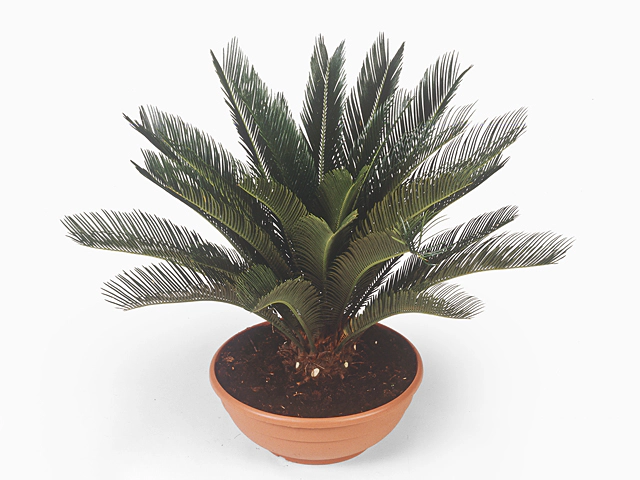Cycas revoluta

| Leaf tip | Aculeate |
| Fruit type | Cone |
| Leaf margin | Entire |
| Leaf type | Foliage leaf |
| Leaf, general shape | Elongate |
| Structure (tissues) | Woody |
| Plant, growth type | Erect |
Cycas revoluta, commonly known as the fern palm, is a fascinating plant with unique characteristics. Its leaves are elongated and have an entire margin, giving it an elegant appearance. The leaf tips are aculeate, which adds to its intriguing aura.
One striking feature of the Cycas revoluta is its fruit type - it produces cones. These cones contain the plant's seeds and add a touch of natural beauty to the overall aesthetics. The woody tissues of the Cycas revoluta provide it with a sturdy structure, allowing it to stand erect and thrive in various environments.
The growth type of the Cycas revoluta is erect, which means it grows upwards towards the sky. This makes it an excellent choice for landscaping purposes, where it can add height and visual interest to gardens or outdoor spaces.
The Cycas revoluta is not only visually appealing but also has cultural significance. It is commonly used in Asian and Japanese gardens, where it is considered a symbol of longevity and prosperity. Its unique foliage and architectural form make it a popular choice for adding a touch of exoticism and mystery to any landscape.
The fern palm is a hardy plant that can tolerate a wide range of conditions. It thrives in well-drained soil and prefers full sun or partial shade. It can also withstand drought conditions, making it a low-maintenance option for gardeners.
When it comes to care, the Cycas revoluta requires minimal attention. Regular watering and occasional fertilization during the growing season are usually sufficient. However, it is important to note that all parts of the plant, including the seeds, are toxic if ingested. So, it is essential to handle it with care and keep it away from children and pets.
In conclusion, the Cycas revoluta, or fern palm, is an alluring plant with its elongated leaves, aculeate tips, and cone-shaped fruit. Its woody structure and erect growth type make it a sturdy and visually striking addition to any landscape. With its low-maintenance needs and cultural significance, it is no wonder that the Cycas revoluta is a popular choice among gardeners and landscape designers worldwide.
Market availability index by month:
| Jan. | Feb. | Mar. | Apr. | May | Jun. | Jul. | Aug. | Sep. | Oct. | Nov. | Dec. |
|---|---|---|---|---|---|---|---|---|---|---|---|
| 4 | 3 | 3 | 3 | 3 | 3 | 3 | 3 | 3 | 3 | 3 | 3 |